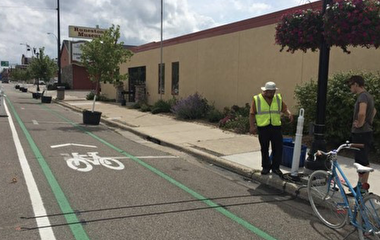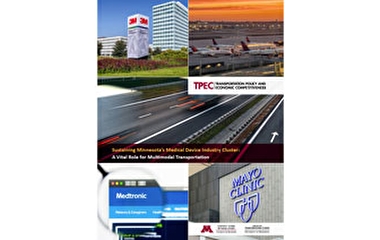George Schember, vice president of Cargill Transportation & Logistics, became the chair of the CTS Executive Committee in July. Below, Schember shares his thoughts on how transportation research can help Minnesota maintain its economic competitiveness and provide pragmatic solutions to real-world problems.
What transportation challenges should be prioritized for Minnesota’s success?
Transportation has increasingly gained the attention of stakeholders in Minnesota. I believe that stems from both increasing awareness of its importance to our overall economic competitiveness as well as recognition of the impact it makes at the individual level. Our challenge is to continue to improve the system while prioritizing the largest positive impacts in an environment of constraint.
Expectations for the performance of our transit, bikeways, roads, ports, and so on are increasing. At the same time, I see other states and countries moving forward. Minnesota is a truly great place to live and do business in. The challenge is this: How do we ensure our transportation systems maintain that competitiveness and meet our expectations well into the future?
How can U of M research help leaders address these challenges?
I get excited hearing about the research projects that are creating new insights or pragmatic ways to solve current problems. Whether it’s a study highlighting transit access to available jobs or new ways to improve road safety at lower cost, researchers create that unique insight that leads to new and innovative ways to solve very real-world problems.
So many elements—from environmental sustainability to equity to quality of life to economic and public policy—intersect at the crossroads of transportation policy, planning, and execution. Research leaders bring forward a fact-based, insightful lens to create options. Some say all transportation is local. That is true, but so is the fact that all transportation is connected.
How can the U of M and the private sector collaborate to improve transportation?
While collaboration is occurring, more can be done. Most private-sector entities think of their transportation issues and opportunities individually, as in, “How do I maximize my opportunity or solve my problem?” I think the role the U of M can play is in aggregating and prioritizing those issues to then apply research that has the greatest leverage potential.
The U of M also can play a role in bringing together the various viewpoints of stakeholders, all of whom are sharing the same asset—Minnesota’s transportation system. Lastly, I am a big advocate of bringing “the outside in.” Other states and universities are working on many of the same issues. The U of M and its researchers certainly play a role in bringing the best thought leadership to the state.
What changes do you anticipate for supply chains and the freight industry, and how can the U of M support these changes?
The changes we are seeing currently are immense, and the speed of change is increasing. For decades, transportation was thought to be a sleepy little thing that was always there in abundance at a very low cost. But now business supply chains are putting more and more pressure on transportation systems. That will only continue.
Everyone likes to focus on electric vehicles, automated vehicles, and other things on the horizon. While these are definitely worth pursuing, I think the availability and usage of data related to our systems is the next boundary to cross that really makes a significant difference. Supply chains strive to optimize costs and value delivery. More and more, data are becoming available to assist in both of these outcomes. Incorporating data on transportation utilization and effectiveness will yield strong benefits to those that pursue it. Research can both enable this connection as well as draw the picture for the potential outcomes.



